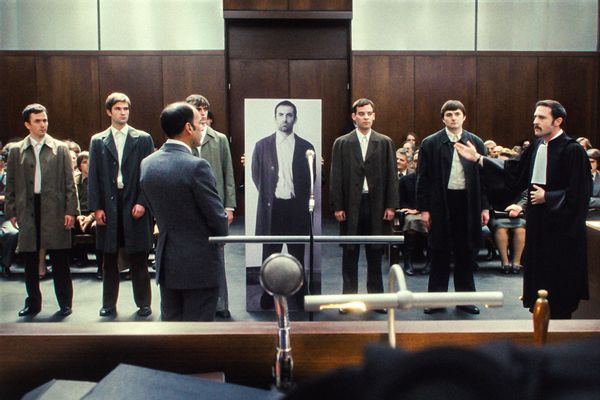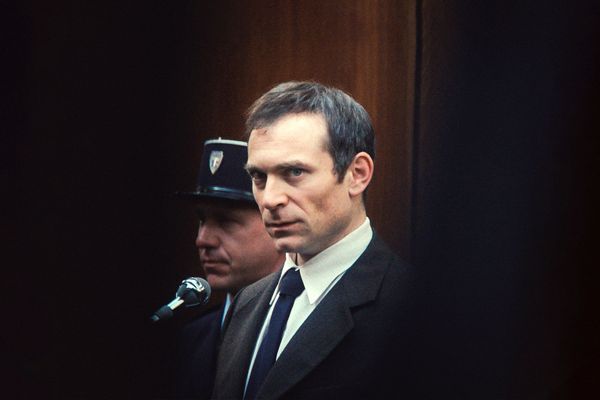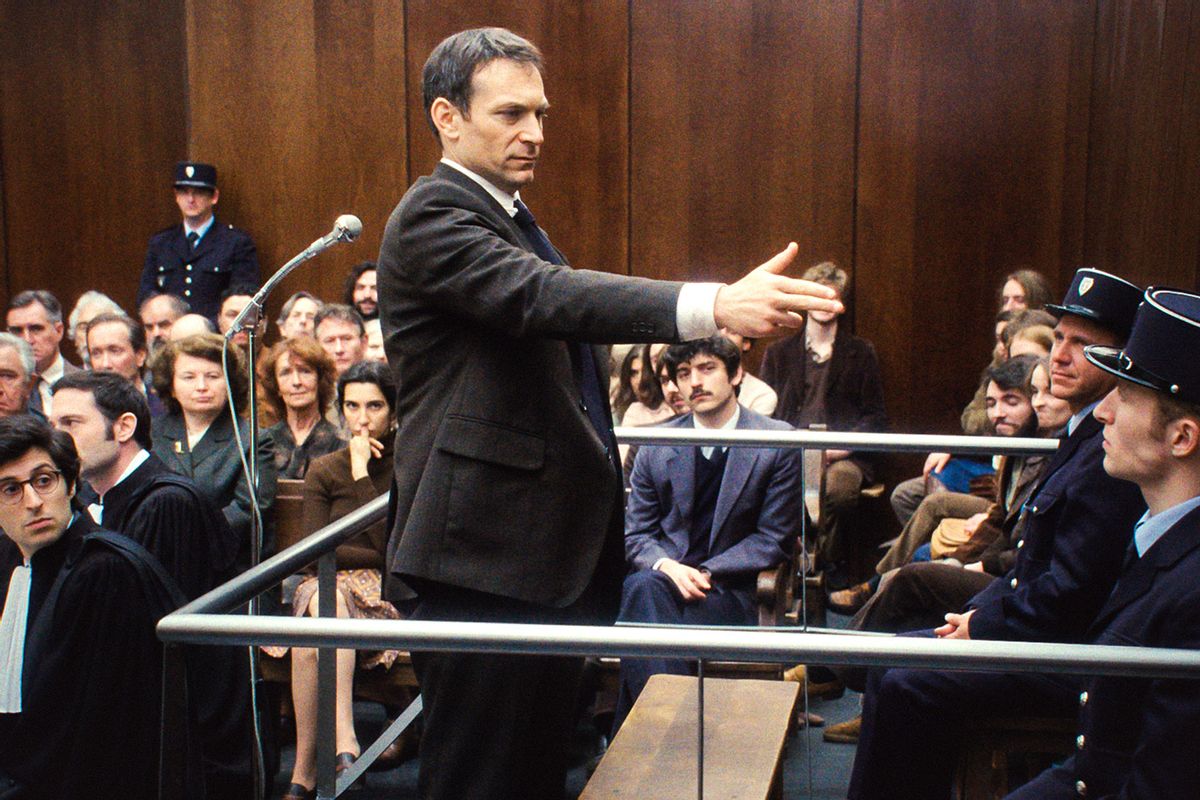In 1970s France, the trial of Pierre Goldman was known as “The Trial of the Century.” Goldman was charged in April 1970 with “four armed attacks, one of which led to the death of two pharmacists.” Sentenced to life imprisonment in December 1974, Goldman insists he is innocent of the murders. In November 1975, the appeals court transfers the case to the Amiens Criminal Court where Goldman is retried for his crimes.
"Goldman had a relationship to truth that was very blurry."
“The Goldman Case” is director/cowriter Cédric Kahn’s gripping, dramatized recounting of the trial and filmed almost entirely in the courtroom. As witnesses testify, Goldman speaks out, his supporters react, and the accused’s lawyers try to mount a defense for their client. The case is as fascinating as Goldman’s character. He was a Polish Jew, born in France, who became a revolutionary and spent time in Venezuela. He was assassinated in 1979 “in conditions that remain unclear.”
Kahn’s film portrays Goldman as a man who wants the facts of the case to prove his innocence. Yet he also refuses to identify someone who can prove his innocence because he does not rat on people, and, he insists, he is innocent of the killings. Goldman also sees himself as a “Jewish warrior,” and a scapegoat for the crimes. The police are racist and antisemitic and intimidate witnesses who provide contradictory testimony. But Goldman’s actions in the courtroom, which include insulting the prosecution’s lawyer, cause his attorneys grief, and at one point, cause him to be restrained.
In the title role, Arieh Worthalter delivers a committed performance, with Arthur Harari lending fine support as Goldman’s lawyer, Maître Kiejman. (Harari is no stranger to courtroom drama; he won an Oscar for cowriting “Anatomy of a Fall.”)
“The Goldman Case” is riveting as it presents the courtroom proceedings and the verdict and its aftermath. With the assistance of interpreter Nicholas Elliott, Kahn spoke with Salon about Goldman and his trial.
How did you learn of the Goldman case and what interested you about this particular trial?
My first encounter was reading Goldman’s autobiography. I was very interested in the character and doing a film about justice. I saw the possibility of making a film that was dialectic, where words and speaking were at the center of the film.
Did you have access to transcripts or footage from the case? How did you create the narrative since you imagined this as a dialectic film?
In France, the law forbids filming or photographing trials. We tried to get the transcripts, but they weren’t granted to us. We recreated the trial using newspaper articles from the time, but since a lot of things were missing from those newspaper articles, we recreated the “gaps” by making things up. It’s a little paradoxical, but we invented by trying as much as we could to maintain the spirit of truth.
 The Goldman Case (Menemsha /Moonshaker)What can you say about filming “The Goldman Case” almost entirely in the courtroom? There are little to no “private” moments.
The Goldman Case (Menemsha /Moonshaker)What can you say about filming “The Goldman Case” almost entirely in the courtroom? There are little to no “private” moments.
It is specifically because these private moments would have created subjectivity for the viewer. I wanted the viewer to be in the position of the juror and to be constantly or permanently confronted with the question of truth.
Goldman is shown to be aggressive in the courtroom. He is righteous, he is outspoken, he is rebellious. He is also loyal and refuses to rat on someone who can prove his innocence. He is an activist and a “Jewish Warrior.” He feels guilt and may be seen by some as a martyr. What did you think of his character?
He is all of those things, but what one has to remember is that he is someone who is trying to save his life because at the time, he still risked the death penalty. I think he was fragile psychologically or “borderline,” as we say. Goldman had a relationship to truth that was very blurry, like all people who are “borderline.”
We need your help to stay independent
What do you believe he believed?
I believe Goldman believed in his innocence. But your question is a complicated one. I believe he wanted to be a hero. His models were his parents who lived through exceptional circumstances — the war; they were resistance fighters who emigrated from Poland. Goldman was someone who came “too late.” He would have liked to have lived in exceptional circumstances. He would have liked to have had an exceptional life.
That may explain why he went to Venezuela. There is a question of Goldman’s past being examined — including his political views. A line in the film by one of his lawyers says that you can’t understand Pierre Goldman without understanding the impact of his family’s past, his personality and his struggles. What did you think of that?
Regarding Venezuela, Goldman himself says that he arrived too late, after Che Guevara had died and after the guerrilla warfare was over. What one has to understand about Goldman is that he was reunited with his mother in the 1960s. He admired her tremendously as a militant and revolutionary. He took her as his model, and it was her that directed him to warfare in South America. Not much happened in Venezuela — or, very anodyne things did. He was a long way from revolutionary war. So, in 1969 he returned to France, and became a stickup artist. What is fascinating about Goldman is the gap between his discourse and reality. Thanks to the power of his discourse, of his words, he created a kind of fanaticism around him. The French Left at the time admired him and were his fans. They had no doubt of his innocence.
What did you think of Goldman’s behavior in the courtroom? He lashes out against lies and injustice at incredible risk. That is where we see his character.
From my perspective, his defense strategy, is very risky, nearly suicidal. I’m quite in agreement with his defense lawyer, Kiejman. Because Goldman politicizes everything. He brings up antisemitism and racism, but he does not deal much with the facts. Kiejman is very rational. There are many moments in the trial when one gets the impression that Goldman wants to be convicted. Actually, he is putting on a show. It seems like it is more important for him to do his show than to be exonerated.
The issues raised about antisemitism, racism, police abuse and intimidation persist today. Is your film showing us how things have not changed? Do we not learn from history?
It is absolutely timely. When we started to write the screenplay, we thought we were making a film about the 1970s. But we realized the political context and French society had not changed that much. It was probably the same context we had during Occupation when a part of French population had collaborated, and a part of the French population resisted. I observe certain deep-seated constants in French society. It is a society that does not change that much.
How does this film fit into your career? Your films, such as “Wild Life” and “A Better Life” are critical of society. Why did this film speak to you in this moment?
"His assassination is part of his legend."
That is a difficult question. There is always an instinctive aspect in the choices we make about what films to make. This is a film I wanted to make for a long time. But it is a film that stands apart for me because it is the first one that I made with a Jewish subject. I was happy to deal with the subject of Judaism through a character who was subversive. He lived surrounded by Black people who shared the struggle of Jews. He was, in a sense, a marginal Jewish man.
Did you identify with Goldman?
I looked at Goldman with a lot of curiosity as well as a mix of fascination and antipathy, but I did not identify with him. I identified more with Kiejman. For me, the device of using only the trial in the film was a way of keeping a distance from the character. If I had private scenes with him or scenes with him alone, I wouldn’t be able to keep this distance from him.
 The Goldman Case (Menemsha /Moonshaker)How did you work with Ariel in creating Goldman’s character?
The Goldman Case (Menemsha /Moonshaker)How did you work with Ariel in creating Goldman’s character?
I did a work session with Ariel before I cast him. He had read the screenplay. He was so convinced and inhabited by the character that right away I trusted him. He worked a lot on his own. He read Goldman’s book several times and he really knew the screenplay by heart, so he arrived extremely well prepared. He needed to be isolated on the shoot a lot, and needed a lot of time alone, so, in fact, we did not communicate very much. We created a real courtroom with a real audience that was very reactive. Ariel had to “fight for his own innocence” in a sense. The only question he asked me before we started shooting is, “Do you think he is innocent or guilty?” I said, “I don’t know, but you have to play him with the conviction that he is innocent.”
Do you think Goldman was innocent or guilty? Although, it almost doesn’t matter.
I never answer that question. But I am convinced of something. I do have a position.
I like that the film forces you to think critically about a man who is a criminal, but you kind of want him to be innocent.
In reality, Goldman was very seductive. That was the power of his allure and his discourse. That is why justice is so hard to deliver. It is a film about justice and truth. What is truth?
And I guess we’ll never know . . .
No, but that’s what’s interesting. There is a mystery about Goldman before the film, and the film maintains that mystery about him. To this day, there are still many books and articles about Goldman. People are still asking questions about his innocence, and his sincerity. I’m not going to tell you because I respect justice and the legal proceedings. But I am very much fascinated and admiring of Goldman’s intellectual brilliance. That’s very impressive, but if one is a rational person, the lawyer’s discourse is far more reassuring.
Want a daily wrap-up of all the news and commentary Salon has to offer? Subscribe to our morning newsletter, Crash Course.
What are your thoughts about his assassination?
His assassination is part of his legend. What is interesting about Goldman is that he created his own legend. He created it as he tried to save his life. To this day, we don’t know the truth about his assassination. There are many hypotheses, which are, in my view, on the order of mythology. Many people believe that he was murdered by the police, but I don’t believe that for a second.
“The Goldman Case” opens in New York City on Sept. 6, and in Los Angeles on Sept. 13, with a national expansion to follow.
Read more
interviews by Gary Kramer



Shares